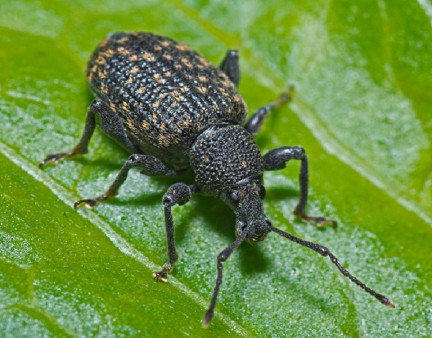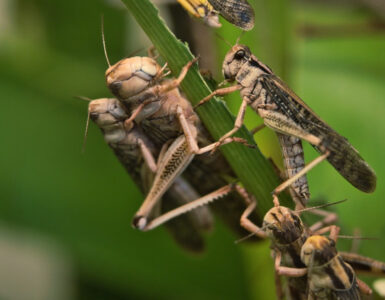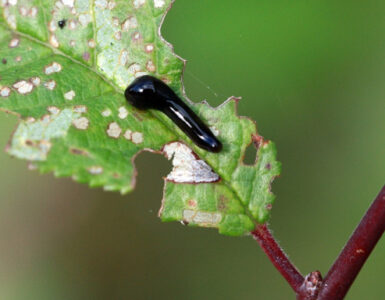It is that time of year again when amateur and professional gardeners alike have to deal with pests. One of these pests is the Black Vine Weevil (Otiorhynchus sulcatus), a member of the Curculionidae family.
Controlling them in natural ways is covered in this article. If you notice signs of garden weevils, take immediate action to get rid of them.
By using natural options, you can ensure that your crops are free from harmful chemicals when harvested. It will also ensure that you do no additional damage to the land or surrounding plants.
What follows are the various natural and organic ways to get rid of vine weevils and their larvae.
1. Remove the Mulch
As the black weevil prefers heavily moist soil, removing mulch and other compost materials and items may be necessary.
However, only do this after detecting an infestation. Mulching is a crucial component in maintaining moisture for plants that require it in many cases.
2. Diatomaceous Earth
This treatment, composed of fossilized remains, has a powdery consistency.
Diatomaceous earth is mildly abrasive. It will break through the protective layers of the exoskeleton and absorb the waxy cuticle of weevils, ants, and other insects.
Overall, DE is a good natural product for managing many insects in and around your garden and house. Sprinkle it around garden beds, pots, and the roots of infested plants.
3. Natural Predators
Invite in natural enemies, or at the very least, don’t kick them out. Frogs, birds, toads, and shrews all feed on these insects and/or their grubs.
Allowing these predators to remain in your garden or even introducing some of them can help control the population of vine weevils.
Insects such as the ground beetle and rove beetles also feed on certain insect pests.
Therefore, acquire thorough knowledge of all the harmful insects residing on your farm. This will ensure that you kill the bad ones and save the ones that will work for you.
4. Pick Them Off
The most time-consuming but easiest home remedy is to pick them off.
To remove these critters, set cardboard, umbrellas, or newspapers at the bottom of the plants. Next, gently shake the plant to dislodge the weevils.
Next, please put them in a sealable bag for disposal. Alternatively, drop them in hot, soapy water to kill them. Pure boiling water will also work.
Stay alert by picking any off by hand that you see and removing the grubs from the ground. Remember, in indoor or greenhouse planting environments, you will not be immune to these pests.
Checking under plants, in garden soil, and even in pots for vine weevils to rest during the day can reveal them.
5. Repellent Plants
Planting certain insect-repellent plants in your garden can help deter pests.
Plants that vine weevils dislike include lavender, mint, and lemon balm. If possible, mix these among your crops to help control or prevent infestations.
6. Sticky Traps
A sticky barrier is an excellent trap that you can place at the base of plants. It traps adults, after which you can dispose of them away from the garden.
Of course, this will only take out the adult weevils. The larvae should be stopped in another way.
However, if these traps become infested with insects quickly, you may need to try another method to eliminate them.
Moreover, there is a wide array of options with barriers. You can buy them online or make homemade vine weevil traps using various items, such as Vaseline or non-drying glue.
However, sticky traps do need regular inspection. This is to ensure that heavy rains, hot temperatures, and other outliers have not damaged them.
Replacing the barriers when they are full will also ensure they continue to work efficiently.
7. Beneficial Nematodes
You can purchase beneficial nematodes to control grubs in your garden. Besides, you can even add them to the soil in pots to get rid of vine weevil grubs.
These nematodes can help control vine weevil larvae by parasitizing them. Death starts within 48 hours of application.
8. Limit Excessive Watering
The moisture in the soil that feeds your garden is one of the most critical components of a successful growing season. However, balance is crucial.
Excess humidity can attract vine weevils. Meanwhile, low humidity can damage crops.
During excessive rain, limit additional water to the garden. Also, consider removing mulches and materials that retain too much moisture in the soil.
There should be a balance when it comes to watering your garden.
Safe Commercial Black Vine Weevil Insecticides
If you’re looking to eliminate vine weevils organically, you don’t have to create a homemade solution. There are safe, ready-made options available for you to choose from.
All these products are OMRI-listed or WSDA-certified for use in organic farming.
9. BalEnce Fly Spray
This product is made with Beauveria bassiana, a natural fungus. It targets pests by infesting them when applied to their outer bodies.
It causes white muscadine disease. The fungus spores thrive on the nutrients in the pests’ bodies, eventually killing them.
It needs to come into contact with the insect to take effect. BalEnce can be applied throughout the growing season, up until harvest.
This product is a natural vine weevil killer and an all-round insecticide.
10. AzaGuard
AzaGuard is a powerful botanical insecticide and nematicide. It claims to control more than 300 insect species.
The main ingredient in this product, azadirachtin, is derived from the neem tree.
This ingredient is a growth disruptor. It impedes ecdysone production, which is necessary for the grubs to progress into full adult stages. Consequently, they will later die.
This spray kills vine weevils. However, it is not harmful to humans or pets that may come into contact with it during its application to gardens.
11. Mycotrol
This version of Beauveria bassiana is a liquid formula that can be applied to your garden. It can help control weevils.
Mycotrol helps control pests at all stages of their life cycle. It works before new adults mature and start chewing on your plants.
12. BioCeres WP
BioCeres WP is another multi-functional product containing Beauveria bassiana. It can be used on all types of weevils, including root weevils, rice weevils, and black vine weevil grubs.
This product also works great against beetles and borers. It will kill these pests in 7 to 14 days.
Vine Weevil Life Cycle
The lifecycle is one generation per growing season. These pests will overwinter as nearly mature larvae and come out in the spring.
Hatching occurs in about ten days, after which they burrow and start eating in gardens.
Getting rid of them and acting quickly will determine your ability to stop infestations early.
Damage
The signs of an infestation are easily visible. There will be notches chewed into plants and white or light brown eggs in the dirt around the base of the plants.
Additionally, signs of root damage may include wilting and dying plants.
Identification
These small insects are slate gray and measure less than an inch, averaging ¾ of an inch in length. They cannot fly and spend the night chewing on a large variety of plants.
The small grubs of the black weevil are about ½ inch long. They are white and C-shaped.
These grubs tunnel through roots as they feed. This can cause large-scale damage to your plants.
Takeaway
These slate-grey, unassuming black pests are a sign of trouble ahead in your garden. At the very first signs of trouble, start with a black vine weevil control plan.
Remember, the insects you see on the plants are not the worst of it. The larvae still in the moist soil will be doing the most damage when this insect is present.
But as you can see, there are a host of natural options you can employ to help control these critters. With some due diligence, prompt action, and regular monitoring, you can minimize the risk to your garden.








Add comment